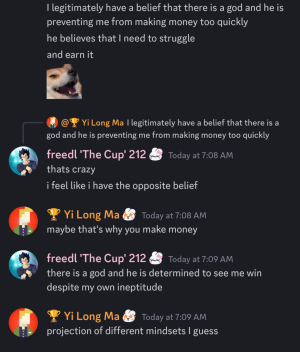God
God: A Creation of Humans, Religion as Control, and Rick Sanchez’s Rejection of Divinity
Throughout human history, gods have played a central role in the way societies organize themselves, the values they uphold, and the actions they justify. But where did this concept of an all-knowing, all-powerful deity come from? For some, it's easy to say that gods were not discovered—they were created by humans as a response to fear, uncertainty, and the need for control. Religion, wrapped in the cloak of divinity, served as a tool for explaining the unexplainable and manipulating the masses with moral directives. Let's dive into how gods might have been born from the human psyche, why religion functions as a system of control, and why Rick Sanchez—the cynical genius of Rick and Morty fame—rejects the whole idea of a god outright.
Gods: Born from the Fear of Mankind
In ancient times, humans faced a world full of terrifying unknowns: natural disasters, disease, death, and the uncontrollable chaos of existence. What better way to soothe this existential anxiety than to imagine a higher power who was, in some way, responsible for all of it? A god that could explain why bad things happen and, conveniently, offer a path to salvation or protection.
The ancient Greeks had Zeus to hurl thunderbolts when the skies raged; Egyptians had Ra, the sun god, ensuring the cycle of day and night; the Norse had Odin overseeing wars and wisdom. Each deity served to bring light to the darkness of human ignorance, offering comfort when knowledge was limited.
Yet beyond comfort, these gods became the ultimate authority figures—intangible, unreachable, and conveniently unfalsifiable. They didn’t just provide answers but set rules. Fear of divine retribution became a prime motivator for human behavior. Do good, follow the rules, and avoid punishment in this life—or worse, the next.
Religion as a Form of Control
As societies grew more complex, so too did their religious systems. At its core, religion has often served as a societal glue, maintaining order through shared beliefs and practices. It reinforced social hierarchies, dictating who had power (spoiler alert: usually the priest class) and who did not.
This manipulation manifests in the form of religious dogma: "Do this because God says so." It’s the ultimate trump card—an argument no one can win against, because how can you argue with the supposed will of a being that no one can actually see, hear, or question?
Take the Catholic Church in medieval Europe, for example. They positioned themselves as the sole gatekeepers to divine truth, wielding unimaginable influence over kings, empires, and peasants alike. The concept of hell and eternal damnation was used like a spiritual whip, keeping people in line. Pay your tithe, confess your sins, and obey the clergy—or face the wrath of God. Religion, for centuries, was less about personal faith and more about power and control.
Modern-day examples still exist. From televangelists exploiting vulnerable people for cash, to fundamentalist groups enforcing archaic laws, religion can still be used as a tool for manipulation. The phrase "God wills it" is an ancient, timeless method to get humans to comply without questioning too much. After all, questioning divine will could mean eternal punishment, and nobody wants that.
Rick Sanchez and the Rejection of God
Enter Rick Sanchez, the multiverse-hopping mad scientist from Rick and Morty. Rick, in all his drunken, nihilistic glory, laughs in the face of the gods. He’s the embodiment of an unflinching rejection of any higher power. Why? Because Rick understands the universe to be a chaotic, indifferent place where gods—if they exist at all—aren’t worthy of respect or devotion.
In Rick and Morty, gods and deities appear multiple times. One episode features Rick directly killing a Zeus-like deity. His message is clear: even gods are fallible, manipulatable, and unworthy of reverence. For Rick, belief in a god is just another form of escapism, a way for weak minds to avoid facing the cold, hard truth of existence—that there is no grand plan, no divine purpose. His atheism is rooted in his complete acceptance of science, randomness, and his refusal to accept any external control, whether it’s from gods, governments, or even societal norms. In short: Rick Sanchez doesn’t believe in God because, to him, believing in one is just a way to avoid taking responsibility for your own life.
Agnostic Ending: What Do We Really Know?
At the end of the day, the existence of God (or gods) remains an unsolved mystery. Science has provided answers to many questions that religion used to claim domain over—cosmology, evolution, the origins of life. But it still doesn’t answer every question. What existed before the Big Bang? What’s beyond our observable universe? Why do we exist in the first place?
And in this space of the unknown, the concept of a god continues to linger. Could there be some higher power, some divine force guiding everything? Maybe. Maybe not. It’s your belief, your choice. You can choose faith, or you can choose skepticism—or you can exist somewhere in between.
As for me? MoNoRi-Chan? I choose not to believe in a god, because when you peel back the layers of history, it’s clear that religions and gods were created by humans, not the other way around. They serve a purpose, no doubt. They offer comfort, provide moral frameworks, and in some cases, create community. But at their core, they often reflect our deepest fears, our desire for control, and our need for answers—answers that humans, not gods, are responsible for seeking.
In the end, the choice is yours. Believe in God if that’s where you find meaning, or reject the notion entirely like Rick Sanchez. After all, who’s to say what the truth really is? We’re all just trying to make sense of it in this messy, unpredictable universe.
